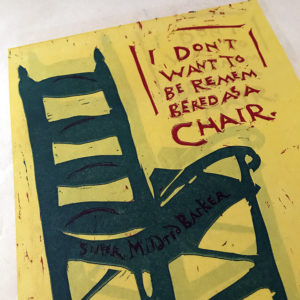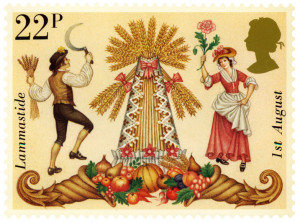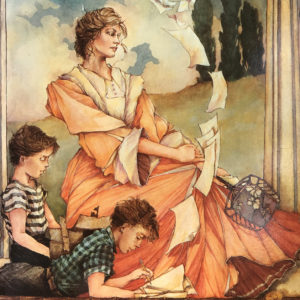In the late 1990s, when I was in grad school learning how to print and how to make books and paper, I’d spend my summers at Chosen Land, the only remaining active Shaker Community in the world. Each summer I would pack my little Dodge Neon and drive up from one corner of the east coast to the other, up from Florida to Maine. I would research, write, print and bind books together with Seth Thompson and with Brother Arnold Hadd, who is one of the busiest people I know, and yet he always found time to warmly welcome me into his world and allow me to immerse myself in it. Aside from the researching and writing and printing and binding, there would also be barn chores and gardening and herb packing and haying and storekeeping and who knows what else. And there would be amazing meals and Sunday Meetings. My world was filled with Shaker music and Shaker lore and Shaker history, day in and day out, and then suddenly in August, just about now, it would be time to go back to school, back to Alabama, which, truth be told, was never anywhere near as good as being in Maine. To leave all these people, who had become like a second family to me, brought me an annual bout of summertime melancholy.
Before leaving each August, though, would come one of the high points of the year in the Shaker calendar: the day they call the Glorious Sixth. It is the day that marks the arrival of the Shakers in America on August 6, 1774. They were a small band from Manchester, England, led by a woman named Ann Lee. Her followers called her Mother Ann, and after suffering much persecution in England, she had a vision that she should move her small church to America, and this is the day they landed in New York Harbor. They called themselves then the United Society of Believers in Christ’s Second Appearing, but they became known as Shaking Quakers, a derogatory name given to them by outsiders to describe the whirling and sometimes frenetic dances that were part of their worship. In their own empowering move, they embraced the name and began referring to themselves as Shakers, and following their arrival in America, the Shaker movement gained momentum. Shaker communities sprouted up throughout New England and west into Ohio, Indiana, and Kentucky. A short lived community was founded even in Florida. They are a liberal and progressive bunch, embracing technology (and inventing a lot of things we use commonly today) and believing in social justice and equality of the sexes and the races even way back to their founding in the 1700s.
The Shakers from early on in their history were monastic communities, and this type of life gradually fell out of favor in the United States. There were thousands of Shakers at the height of the movement in the mid 1800s, but that number declined as the years went on, and one by one in the late 1800s and 1900s Shaker Communities closed and consolidated. And now there is but one left that is still a place of Shaker worship and that is Chosen Land, the Shaker Community at Sabbathday Lake, Maine, the place I was lucky enough to spend summers at. Most of what people know about the Shakers these days are the artifacts they left behind: things like oval boxes and exquisite furniture, handcrafted with beautiful, modern simplicity––pieces that have been known to fetch tens of thousands of dollars (or more) at auction.
Sister Mildred Barker was the eldress at Chosen Land long before I ever started coming around, and though we’ve never met, still I feel I know her in a way. I know her voice, thanks to recordings, and I’ve heard plenty of stories about her thanks to conversations I’ve had with Brother Arnold and with Sister Frances, when she was alive. Sister Mildred famously said a variation of the words in the woodcut that’s in the photo at the top of this essay. Her actual words were, “I almost expect to be remembered as a chair or a table.” The woodcut is one I made in Alabama one of those late summers after leaving Chosen Land, feeling, no doubt, a bit wistful and melancholy. I had the words wrong, but my heart was in the right place. My heart was at Chosen Land. And my heart will be there tonight, too, this Sixth of August––this Glorious Sixth, where Brother Arnold and Sister June will gather with friends at sunset to honor those who came before them, including Mother Ann and Sister Mildred, who will be remembered not at all as a chair, but as the kind and good soul she was.
The print is titled “Sister Mildred’s Lament” and it was carved and printed in August or September, 1996. It’s a print I had long forgotten, but in gathering up some Convivio Bookworks broadsides that are headed off for an exhibition in Japan, it resurfaced––oddly enough, on the eve of the Glorious Sixth. I told the story to the curator and sent her a quick photo, and now Sister Mildred, too, is headed off for Japan in the form of this print. I’m chalking that up to the quality of the story, rather than the quality of the print.
Your purchase of the culinary herbs and herbal teas we sell here at Convivio Bookworks, by the way, all support Chosen Land. The Shakers have been packing and selling herbs since 1799, and helping to support them through their herb industry is one of my favorite things about our catalog. That and how wonderful the place smells every time we receive a shipment of herbs from them; the aroma that comes out of every box we receive from the Shakers takes me right back to the Herb Department inside the old Sisters’ Shop at Chosen Land.


